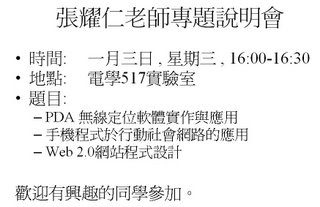
星期四, 12月 28, 2006
星期六, 12月 23, 2006
星期五, 12月 22, 2006
Recent Trends
ADSL -> FTTH
3G -> HSDPA (3.5G) -> 4G, WiMax
CD -> Paid Music Download
TV-> IPTV, DTV, DVB-H
Wireline Phone -> VoIP or VoWiFi
Mobile Phone->VoIP over HSDPA
Spread Spectrum -> OFDM -> OFDM + MIMO
- Point-Topic:光纖降價有取代Cable modem之勢 (2006/12/14)
3G -> HSDPA (3.5G) -> 4G, WiMax
CD -> Paid Music Download
TV-> IPTV, DTV, DVB-H
Wireline Phone -> VoIP or VoWiFi
Mobile Phone->VoIP over HSDPA
Spread Spectrum -> OFDM -> OFDM + MIMO
12-23-2006 Class
Student Presentation (schedule)
12/23
Web 2.0 BBS: Gaaan
Web 2.0 Personal Portal:
Wi-Fi Community Network and Business Model <fon>
預告
12/30 連假日停課ㄧ次
12/23
- Hanks(Social Use of Digital Imagery),
- 徐欣佑(Social Capital),
- 簡里安(Push!Music)
- Tony (Location and Photos),
Web 2.0 BBS: Gaaan
Web 2.0 Personal Portal:
Wi-Fi Community Network and Business Model <fon>
預告
12/30 連假日停課ㄧ次
星期一, 12月 18, 2006
Homework 12/16/2006
For housing services, compare the three websites
http://www.housingmaps.com
http://www.urmap.com.tw/asp/kijiji/
http://www.7house.com.tw
List the differences in the user interface design and usability. Make comments
by your use experiences.
http://www.housingmaps.com
http://www.urmap.com.tw/asp/kijiji/
http://www.7house.com.tw
List the differences in the user interface design and usability. Make comments
by your use experiences.
星期日, 12月 17, 2006
Web 2.0 for NPO (Nonprofit organization)
Web 2.0 is absolutely a trend that NPO should pursue.
I have a study as posted in the following.
Web 2.0 also has some problems that people start to notice. First of all, sharing is limited and diverse.
Various tools exist: Blogs, Flickr, BT, …. It is not uncommon
Various tools exist: Blogs, Flickr, BT, …. It is not uncommon
that one has to combine several services in order to make things done.
For example, save the documents in Google Docs, store the photos on Clickr,
and write blogs on SixApart.
Second, existing Web 2.0 service providers give limited storage and functions.
Second, existing Web 2.0 service providers give limited storage and functions.
There is no roadmap about the new features people
are looking for. Change of the platform is not straightforward, either. For example,
people better not decide to move from Blogger to Xuite, because there is no import
function.
Nonetheless, I think one can still leverage the existing nice services such as Flickr, Google Docs, and Blogger that
are already popular. These services seem generic and have uses in many ways.
As to the mission critical applications that NPO want to build, Web 2.0 essentials can be built into these systems
from scratch. For example, we can do AJAX programming to make the GUI more usable and friendly.
We can also let users contribute and share their data, and even enable them to mash services up, just to name a few.
A far dream may be a Web 2.0 platform that NPO can host their mission critical applications.
In that case, all they need is learn how to use the systems without the bothering IT maintenance problems.
星期六, 12月 16, 2006
Web 2.0
Web 2.0
Web 1.0 is for the user.
Web 2.0 is for the user and by the user.
Web 3.0 is for the user, by the user, and of the user.
examples:
Wikipedia
http://www.google.com/ig
Google News
Software as a Service: Wriely
Panorama Explorer
Mashup examples:
What is Web 2.0? By Andy Budd of Clearleft Ltd
What Is Web 2.0 by Tim O'Reilly
- WYSWYG (What you see is what you get.)
- Personalization
- Mashup
- Sharing
- Feedback
Web 1.0 is for the user.
Web 2.0 is for the user and by the user.
Web 3.0 is for the user, by the user, and of the user.
examples:
Wikipedia
http://www.google.com/ig
Google News
Software as a Service: Wriely
Panorama Explorer
Mashup examples:
- Real time satellite tracking
- HousingMaps: a mashup of Craigslist and Google Maps
- Map your own photes.
- More applications of Google Maps
What is Web 2.0? By Andy Budd of Clearleft Ltd
What Is Web 2.0 by Tim O'Reilly
星期六, 12月 09, 2006
Unlicensed Mobile Access
UMA Technology
in contrast, uses the Internet for routing
Issues
- seamless handoff from WiFi to cellular networks,
- converging the fixed and mobile worlds
- under the control and billing of the mobile operator
- a new network element (the UMA Network Controller, UNC)
- UNC interfaces into the core network via existing 3GPP specified A/Gb interfaces.
- protocols for the secure transport of GSM/GPRS signalling and user plane traffic over IP.
in contrast, uses the Internet for routing
Issues
- WLAN couldn’t really support it due to the hand-off issues among APs.
- Extricom selling 8 and 24-port WLAN switches
- client on the network associates to the switch, not the radio/AP
- No de-association or re-association
訂閱:
文章 (Atom)
 本網站使用百分之百可回收電子
本網站使用百分之百可回收電子